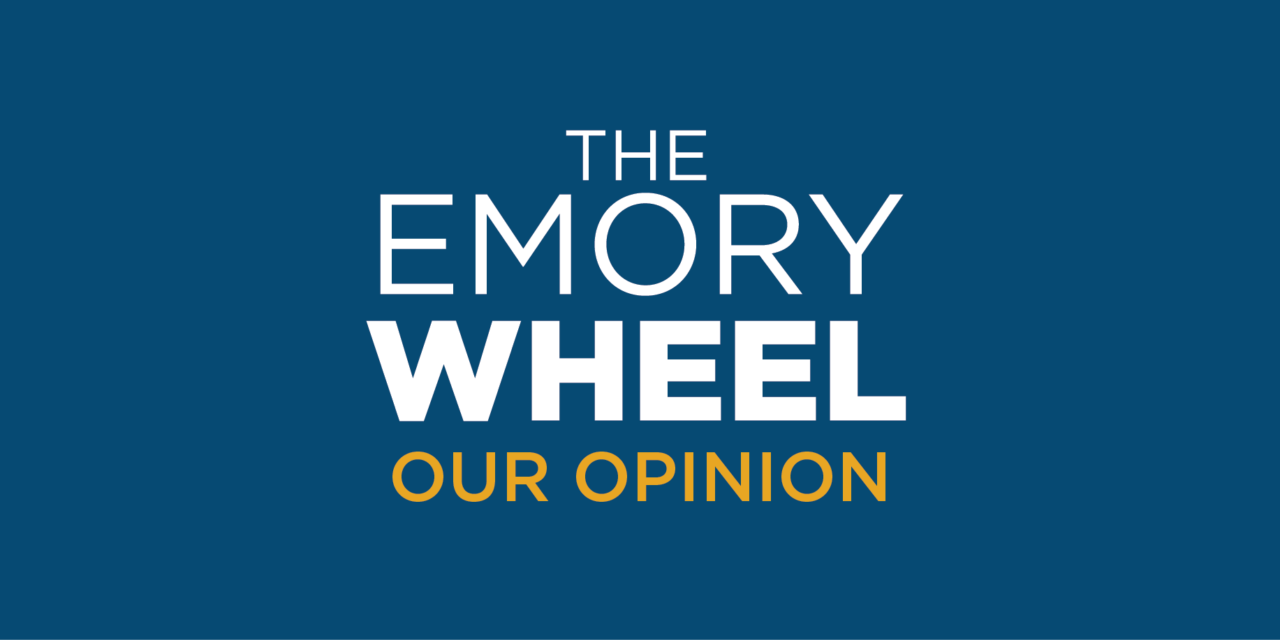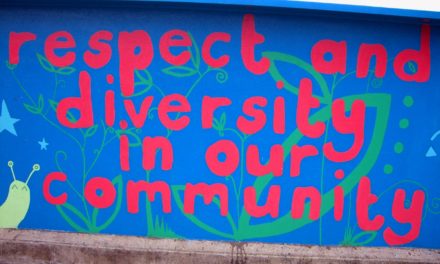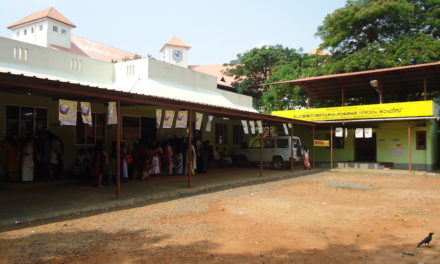On Oct. 31, a female reported a sexual assault at the Sigma Alpha Epsilon fraternity house, according to a Nov. 2 all-Emory email.
As a result of the reported assault and several recent instances of sexual violence, substance abuse and discrimination on campus, the Interfraternity Council (IFC) enacted a self-imposed ban of social activities until there is evidence of “tangible and proactive steps mending the flaws in [the] social culture at Emory,” according to a Nov. 2 IFC statement.
We at the Wheel would like to applaud Emory’s and IFC’s reaction to this terrible incident and the underlying issues surrounding sexual assault. As a result of advocacy from Sexual Assault Peer Advocates (SAPA), the all-Emory alert began by reminding the community that no individual asks to be sexually assaulted and included improved language regarding safety tips that avoided victim-blaming.
We commend IFC for taking an appropriate and timely response, taking ownership of enacting change within the Greek community. This response attempts to match the level of severity for sexual assault, and it is the first time in recent memory that such a response has occurred toward a sexual assault at a fraternity. While ultimately, a ban imposed by the Emory administration may have had the same effect, it is an important symbolic gesture that the call to action came from IFC, an organization led by students in fraternities.
Some members of the Greek community and fraternities have voiced perspective of the social ban as a punishment. While the ban has a punitive effect in that it withholds a privilege to have social events, it is a gross misinterpretation to see this exclusively as a punishment. Rather, the ban ought to be seen as a safety measure for students and an opportunity for fraternities to reflect on why sexual assault happens and on the measures that can be taken to prevent it. We ask fraternity members to consciously think about the culture and context surrounding certain behavior exhibited within their community, to move forward gracefully and to handle the IFC decision with maturity, patience and collaboration.
While the ban on social events is only a temporary fix to a larger problem, this is a crucial juncture for changing aspects of a negative culture surrounding Greek life and social events on campus. This is the time to reevaluate the outward reflection of what Greek organizations stand for and for members of Greek organizations to think less about partying and more about opportunities for leadership, scholarship and service.
We recognize that many students, both inside and outside of the Greek community, may still see this as a war against the lifestyle that they have cultivated, but this view impedes progress towards addressing the issue. Instead, members of fraternities should hold themselves and one another accountable for what happens in their houses and take action to prevent sexual assault.
We at the Wheel offer some suggestions that can serve as proactive steps moving forward in the coming days.
First, every member of Greek life should be educated about sexual assault, including SAPA training and bystander intervention. While incoming first-year students are now exposed to basic information about sexual assault and intervention through the Creating Emory program, there is no reason that education should not continue, especially if the trainings are tailored to Greek life and specific issues concerning it.
Although the risks and potential for sexual assault cannot ever be entirely mitigated, education is a valuable first step in fighting rape culture and promoting a safe environment. Additionally, eliminating parties with themes that are misogynistic, promote rape culture or create an atmosphere of sexual degradation should go hand-in-hand with reeducation. Parties called “Business Bros and Secretary Hos” or themed after the Red Light District should not occur on a campus that promotes equality and inclusivity.
Another step should be to increase programming and partnerships with non-Greek organizations in order to create more interconnectedness on campus. Additionally, the University should consider creating a neutral, non-residential social space on campus, perhaps on Eagle Row, where non-Greek organizations can host their own social events. There is a considerable, subconscious power dynamic that occurs in a fraternity house, where a number of private bedrooms just upstairs from a party can add to isolated encounters with strangers, pressures to have sex and perhaps entitlement for those who live in those houses. While this is not a conscious element in the minds of every resident of a fraternity house, this is the underlying structure of the space. If there was a space created for anyone to book and use for social events, Emory could create a truly neutral space for everyone.
Finally, there should be increased dialogue between the administration and Greek life. No member of campus should feel that the University is working against them, and we hope the University and IFC are taking measures to ensure that members of Greek life fully understand the rationale and importance of this ban.
For the Emory community to move forward and address the seriousness of sexual assault, we must work together to create a culture that is safe for all students and learn from our past to grow in the future. Every Emory community member should be aware of how absolutely severe this problem is on our campus, and we should all treat it with its deserving attention and respect.
The above staff editorial represents the majority opinion of the Wheel’s editorial board.
The Emory Wheel was founded in 1919 and is currently the only independent, student-run newspaper of Emory University. The Wheel publishes weekly on Wednesdays during the academic year, except during University holidays and scheduled publication intermissions.
The Wheel is financially and editorially independent from the University. All of its content is generated by the Wheel’s more than 100 student staff members and contributing writers, and its printing costs are covered by profits from self-generated advertising sales.








I dont get it. Just prosecute perpetrators in the court of law. end of story. No scapegoating, no group punishments, no bullshit. Go to jail for a long time thats it, Georgia has nice and tough laws.
I dont get it. Just prosecute perpetrators in the court of law. end of story. No scapegoating, no group punishments, no bullshit. Go to jail for a long time thats it, Georgia has nice and tough laws.
I don’t get it either. Many colleges have confronted these same issues with the Greek system and abolished it. The Emory faculty and BOT need to get moving on abolishing a system that works in complete contradiction to the mission and values as stated by the University. Look back over the years…has anything really improved? Does the University really need this kind of negative press?
Somebody in authority needs to stop the spin and step up.
Emory should not put a full stop to a vibrant and involved community that makes up a full third of the student body. I agree that non-greek organizations should be more prevalent in the social life at Emory, but making this happen is not Greek life’s responsibility. Greek students are willing to come together to plan, fund, and execute social events that are open to non-members, while other organizations do not. Furthermore, students worried about unequal power dynamics in fraternity houses should consider that anyone hosting an event has more control over a situation, so no matter who hosts an event-even in a non-residential space-could exert pressures and feel entitled at that event. Would Emory be better off with no social events at all? Would Emory be better off eliminating Greek life? Greek life at Emory encourages higher GPA, involvement in philanthropy and leadership, and alumni donations. Lets figure out another way to eliminate the problem of sexual violence.
Moreover, it is impressive that the Emory Community sees fit to assume guilt of the accused, while the only information the community has received is that a sexual assault was reported. Should it be found in court that an assault was indeed committed the perpetrator should be punished, as it is a heinous crime. But the assumption of guilt instead of innocence is one a backwards way of thinking. Innocent until proof of guilt is one of the ideals our country was founded on.
All exclusive membership groups (clubs, fraternities, families) run the risk of protecting predators (cheaters, rapists, thieves) by placing the pledge to unity, brotherhood and secrecy above honor, doing the right thing, and the law. That is the perfect environment for bad behavior to thrive. Especially when that bad behavior is done by an otherwise charming or wealthy person. Good guys will look the other way and try to ignore their hunch that a brother is out of control.
Why let a few rotten apples poison Greek Life? Get rid of them! IFC leaders have the power to make Greek Life everything it wants it to be without the sexual abuse. Be pro-active. Be clear on the behaviors allowed by members of your fraternity. When you see a guy out of control, remove him from harming himself or others. Say “no” to drunk sex at parties. Have consequences for the brothers (you know who they are) whose “sex lives” are dependent on getting women to lose their sobriety (can’t consent with intoxicated). Don’t be afraid to be “good guys.” We can have a robust, fun, even wild, college experience without sexual assault.